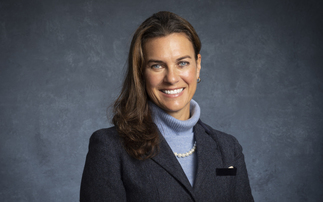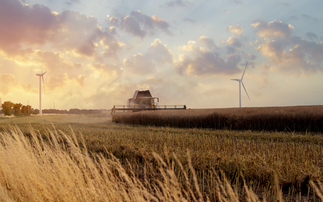It's been an eventful decade for BusinessGreen, and if anything the coming years promise to be even more exciting
This month marks the 10th anniversary of BusinessGreen as we chalked up a full decade of reporting on the most exciting and important economic and technological revolution of any of our lifetimes. Entirely coincidentally, but with a certain synchronicity, the actual birthday fell on October 12th, the same day as the government launched its long-awaited Clean Growth Strategy.
The timing was fortuitous as the strategy provides a handy reminder of the drastic changes that have shaped the green economy over the past decade. It shows how the low carbon economy has consistently outperformed the wider economy, supporting over 430,000 jobs, and pushing clean energy's share of the power mix up to 50 per cent. It shows how coal has been almost pushed off the grid, as solar costs have fallen more than 80 per cent and wind energy costs have halved over the course of the decade. It shows how UK emissions have fallen 42 per cent since 1990, even as the economy has grown 67 per cent. It shows how landfill waste has fallen by three quarters since 1997 and household energy consumption has plummeted. And it shows how ultra-low emission vehicles have been transformed from the glorified golf buggy G-Wiz's of 2007 to Tesla's Model S or the Toyota Mirai.
It also reiterates that for all the setbacks and dramas of the past decade, the political consensus on the need to build a low carbon economy has held, as the sector has continued to combine significant emissions reductions with economic growth and prosperity. The hypothesis we bet on back in 2007 - that the business community was preparing to embrace a new wave of clean technologies and sustainable business models in pursuit of a more effective form of responsible capitalism - has been amply vindicated.
To mark the 10 year milestone, this week we are running a special series of articles on how the past decade of green business progress has transformed the corporate sustainability, investment, energy, transport, and policy spheres. We will also be previewing a new report, Secrets of the Pioneers, which we will publish next month with Greenhouse PR at our inaugural BusinessGreen Leaders' Summit. The report will explore how some of the most high profile figures in the green economy assess the past decade and the sector's future prospects, starting today with the peerless Christiana Figueres.
Birthdays are meant to offer a chance to reflect and just as 2007 felt like something of a turning point for the fledgling green economy, 2017 feels like another liminal moment for an industry that is now firmly embedded in the corporate mainstream.
BusinessGreen launched a year after Al Gore's An Inconvenient Truth had brought the scale of the climate threat to widespread attention and a year prior to the passage of the UK's Climate Change Act. It also came as the Bali Summit reinvigorated global efforts to deliver an international climate change pact - a move that would bear fruit eight years later on an historic night in Paris.
2007 was by no means year zero for the green economy - thousands of individuals and businesses had been striving for years to lay the foundations for a greener economic model. But it was around that time that the first major corporates started to seriously engage with the scale of the climate change threat and the low carbon opportunity. It was then that political leaders started to hug huskies and Lord Stern began work on his ground-breaking economic argument that the benefits of tackling climate change far outweigh the costs. And it was then that start-ups and conglomerates alike started to demonstrate the viability of scalable clean technologies.
The ensuing decade has been marred by more disappointments and frustrations than I care to remember. The countless, short-termist, policy setbacks and budgetary constraints that undermined the UK's green economic strategy; the collapse of a Copenhagen Summit that promised to fast track global climate action; the baleful influence of discredited climate sceptic arguments; the election of an ecologically and economically illiterate man-child to the most powerful office in the world; the uncertainties and insecurities unleashed by Brexit; and the steady drum beat of borderline apocalyptic environmental warnings - they have all served to place barriers in the path of a green industrial revolution that would otherwise be considerable further advanced than it is.
But through it all green business progress has been nurtured and maintained. If anything, it has accelerated. Thanks to the innovation and inspiration of many of the businesses and technologies we are privileged to write about the green economy has continued to prosper. Global emissions and economic growth have been fully decoupled for the first time since the industrial revolution. The Paris Agreement provided evidence the appeal of multi-lateralism and shared self-interest can still cut through in an insecure world. Renewables emerged as the dominant force in the global energy market, just as electric vehicles sent shockwaves through the auto industry and the carbon bubble started to redefine how investors think about long term risk and opportunity. The UN Sustainable Development Goals and the Science-Based Targets movement provided multinationals with a new, environmentally sustainable framework against which to measure their progress - it is a framework thousands of companies are now embracing.
As for BusinessGreen, we have attempted to track this fast-changing landscape and keep our growing audience up to date on the trends and technologies that will shape the next decade and beyond. If launching a new website just as the global economy was about to experience its worst crunch in nearly a century was a move Sir Humphrey would describe as "brave", then trying to build a media brand as that industry experienced unprecedented levels of disruption was positively courageous.
And yet, 10 years on, the site and its expanding portfolio of events is still going strong. It felt like a big decision, but we erected a paywall at about right time, charging less than a pound a day for access to our in-depth content and ensuring we could continue to invest in a strong editorial offering. Similarly, we took the step to build an events programme alongside our online presence, providing a platform to celebrate the sector through the UK's largest green business and clean tech awards. It is a portfolio we will add to next month with our inaugural summit, bringing together some of the UK's green business thought leaders. Meanwhile, we have continued to expand our offering to clients, augmenting our advertising platform with a whole range of marketing services and bespoke events.
Our original pitch back in 2007 was to try and fill the space between the mainstream press that regarded environmental issues as the preserve of treehuggers (if they paid them any attention at all) and a business press that ignored the low carbon revolution that was taking place under its nose. That space has been squeezed, as more and more media outlets have recognised both the scale and importance of a fast-expanding, multi-trillion dollar global industry and the existential nature of the environmental risks we all face. However, I hope you agree that there is still a compelling case for a media brand that is committed to providing detailed reporting and analysis of the green economy - and now has a decade of experience doing so.
Inevitably, we haven't got everything right, and like many in the green economy there are times when we feel that we should be further forward than we are. But overall, thanks to our contributors, readers, and a great team, we've been able to help tell the most important economic and environmental story of our generation. Long before it was fashionable to set up political parties on a whim, we flirted with the idea of a new movement in the form of New Environmentalism, wrestled with the tensions inherent to any honest engagement with the modern economy, and interviewed some of the world's most exciting and influential green thinkers and sustainable business leaders. Through it all, we strived to provide a platform for the growing battalion of businesses, executives, entrepreneurs and investors who understand the existential importance and 360 degree attractiveness of building a genuinely sustainable economy.
Now, just as was the case in 2007, the story is evolving once again, and BusinessGreen will continue to evolve with it.
As new challenges have emerged in the shape of the Trump administration, Brexit, and our improved understanding of environmental threats such as air pollution, new opportunities have also taken shape as clean tech costs have plummeted and corporate leaders have embraced the kind of sweeping green business transformation demanded by the government's Clean Growth Strategy. We'll be discussing how these trends will shape the next decade through our coverage this week and through next month's Summit. Then early next year we will unveil a rebrand of BusinessGreen to better reflect the mainstream nature of the green economy and the immense opportunity offered by the coming decade - a new era for the sector where there is simply no option but to drive clean technologies and greener business models right across the global economy.
Ten years on it is, as someone who knew a fair bit about global trends once observed, only the end of the beginning.









